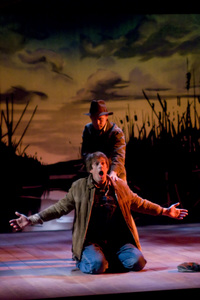

John Hardy and Mike Ostroski star in John Steinbeck's "Of Mice and Men," playing through April 11 at Barter Theatre.
*** Published: March 15, 2009 in the Bristol (Va.) Herald Courier.***
ABINGDON, Va. – "Of Mice and Men," John Steinbeck's poignant masterpiece, is back on Barter Theatre's main stage for the first time in 12 years.
John Hardy is once again perfectly cast in the role of George, and Mike Ostroski is Lennie. My take on Lennie is that he is just a bit more dull than he is portrayed by Ostroski, but nevertheless, Ostroski's interpretation of the character still works quite well.
Hardy and Ostroski are joined in the production by several other Barter actors, all of whom are good in their parts, but Eugene Wolf as Candy, Jasper McGruder as Crooks and, especially, Ashley Campos as Curley's wife, bring a haunting realism to their roles.
"Of Mice and Men" is so well-known it is unlikely one could find anyone who does not know the ending. Yet, seeing it again or re-reading the original story never fails to stir up feelings that are hard to describe or questions impossible to answer. Much of Steinbeck's work was like that, and it is, at this moment in time, just as relevant as it ever was, if not more so.
For example, one of Steinbeck's recurrent themes was the struggle of the "little guys" against wealth and power or, more precisely, against other "little guys" who have allowed themselves to become pawns of the moneyed and powerful.
After all, the CEO of a large bank isn't the one who padlocks widows and children out of their foreclosed homes. It is always a small-time, wage slave such as a deputy sheriff whose hands have to actually be the ones bloodied.
In "Of Mice and Men," it is not the soft hands of the rich bankers and investors in control of California agriculture that strike down Lennie and, by extension, George, but Curley, Carlson and Whit, men who know the same dust, mud and hardship.
Steinbeck also asks us to consider just how much we are, or might be, our brother's keeper, our "brother" being any other human whether related or not. It is left ambiguously murky what relationship there is between George and Lennie, why a sharp little guy such as George would allow himself to be saddled with the hulking and child-like Lennie.
George could, after all, do much better for himself alone. George fabricates several stories about why he allows Lennie to tag along in his protection, but we never know if
any of them are true, and they probably aren't.
Another question that comes out in "Of Mice and Men" is that of how far one is willing to go for those one loves. Can we be, or should we be, willing to love someone or something so much that we hurt or destroy that someone or something to save it although we risk its death or permanent alienation?
We see this theme often in Steinbeck although not usually so brutally realistic as in "Of Mice and Men."
Barter's production of "Of Mice and Men" benefits greatly from the directorial talents of Katy Brown, and a sparse, but spot-on, set designed by Cheri Prough DeVol.
This play is not, and is not intended for, those seeking light entertainment. It definitely isn't for the kids, not because of any profanity or the like, but because a considerable amount of maturity is required to comprehend its full impact.
For dates, times and reservations, call (276) 628-3991 or visit www.bartertheatre.com. "Of Mice and Men" plays through April 11.